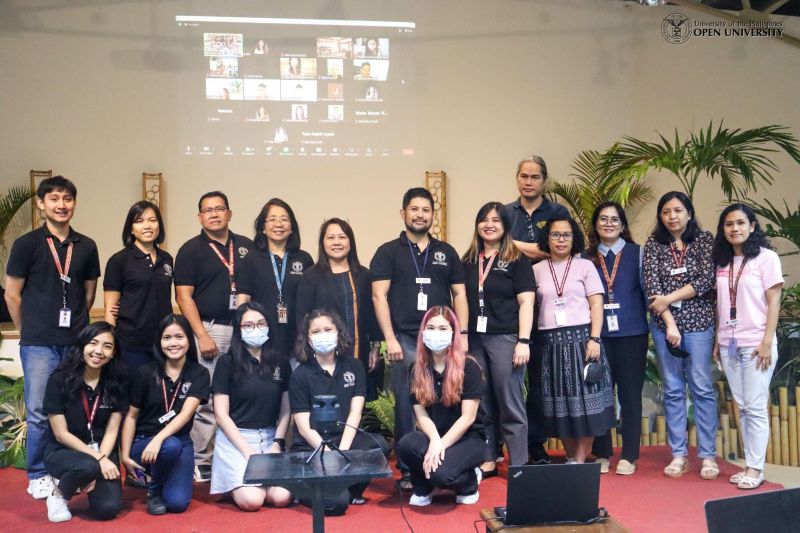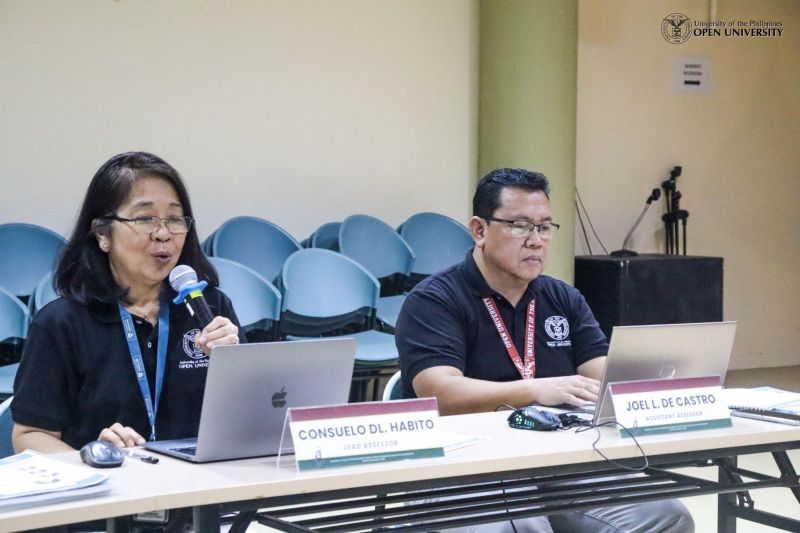
The online and onsite participants, assessors, and organizers of the EQA Assessment of the BAMS program during the Opening Session.
The Bachelor of Arts in Multimedia Studies (BAMS) degree program of the Faculty of Information and Communication Studies (FICS) has gone through the External Quality Assurance (EQA) assessment from 05 December until 07 December 2023, marking a milestone as the first UP Open University (UPOU) program to undergo such activity.
This three-day event, coordinated by the UPOU Quality Assurance Office (QAO) and organized by the FICS, was guided by the assigned assessors with Dr. Consuelo Habito, the current FMDS QA Officer as the Lead Assessor, and Asst. Prof. Joel de Castro, the current PDA for Information Systems Development, as the Assistant Assessor.

Dr. Consuelo Habito (left), the Lead Assessor, and Asst. Prof. Joel de Castro (right), the Assistant Assessor, for the BAMS EQA Assessment.
The UP EQA consists of six types of assessment, categorized from Type A to F. Following the ASEAN University Network-Quality Assurance (AUN-QA) framework, the BAMS program underwent a Type A EQA assessment which consists of external reviewers within the constituent university (CU). Type B brings in external reviewers from a different CU, while type C combines both internal and external reviewers. Furthermore, Type D broadens the perspectives by incorporating insights from external reviewers representing local or international institutions outside UP. Local assessment and accreditation bodies take the lead in conducting Type E assessments, while Type F undergoes evaluations from international assessment and accreditation bodies, solidifying UP’s commitment to global academic standards.
In the opening session held on the first day of the assessment, Dr. Diego Maranan, the FICS Dean, delivered an opening message expressing his gratitude to the assessors and his experience in realizing the significance of subjecting BAMS into quality assurance. He also acknowledged the contributions of the faculty members and staff that were instrumental in the laborious process of producing the Self-Assessment Report (SAR). Additionally, the Director of the UPOU-QAO, Asst. Prof. Mari Anjeli Crisanto, expressed her support and congratulated the program and faculty for accepting the challenge of being the first to undergo EQA.
Following this session were hybrid-focused group discussions and interviews with the SAR writing team members and selected stakeholders, including academic staff, support staff, students, alumni, and employers. The assessors also visited virtual learning and student support platforms, as well as the physical facilities relevant to the program. Prior to the EQA visit, the assessors already conducted a desktop assessment of the program through the submitted SAR.
As a culminating activity, the assessors presented their preliminary findings. In her concluding remarks, Dr. Habito commended the program and the participation of the stakeholders throughout the assessment. She emphasized that this is the beginning of the continuous enhancement of the BAMS program through a principle-based and multi-dimensional approach.
This significant milestone serves as a springboard for the upcoming programs slated for assessment in the coming months, guaranteeing quality enhancement. What sets UPOU programs apart is their unique delivery through open and distance e-learning (ODeL).
Written by Ammanessi Joy Lapitan ♦ Edited by Myra C. Almodiel and Anna Cañas-Llamas ♦ Contributed by the Quality Assurance Office








